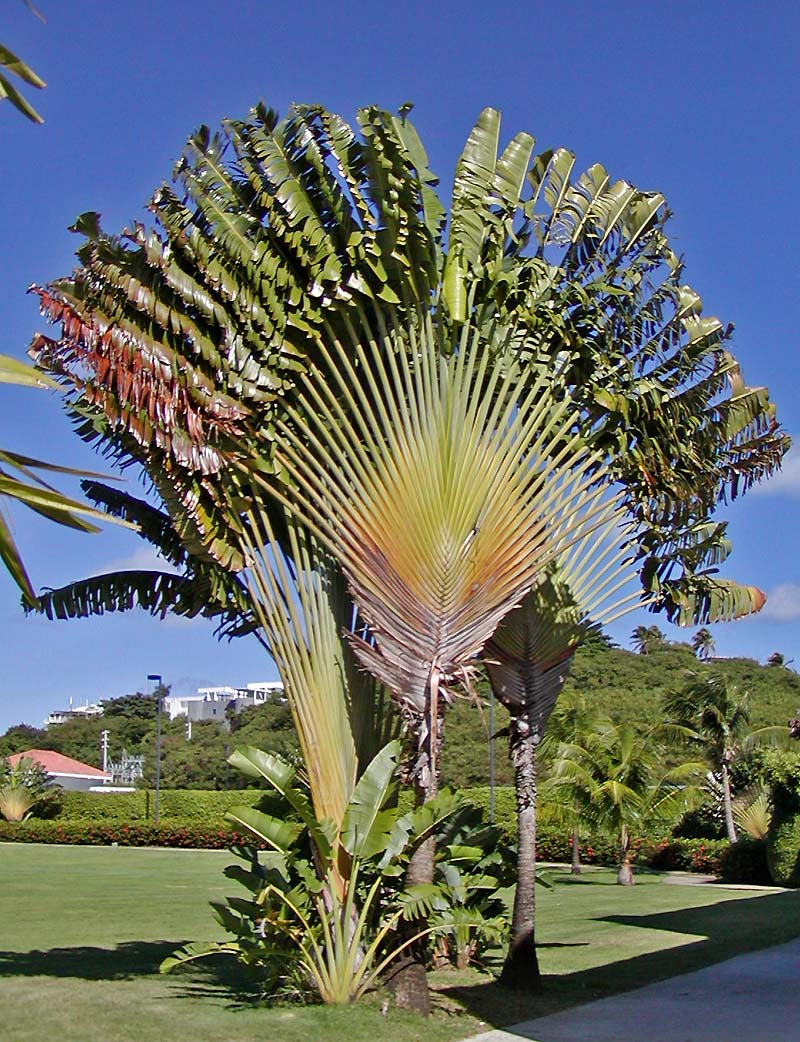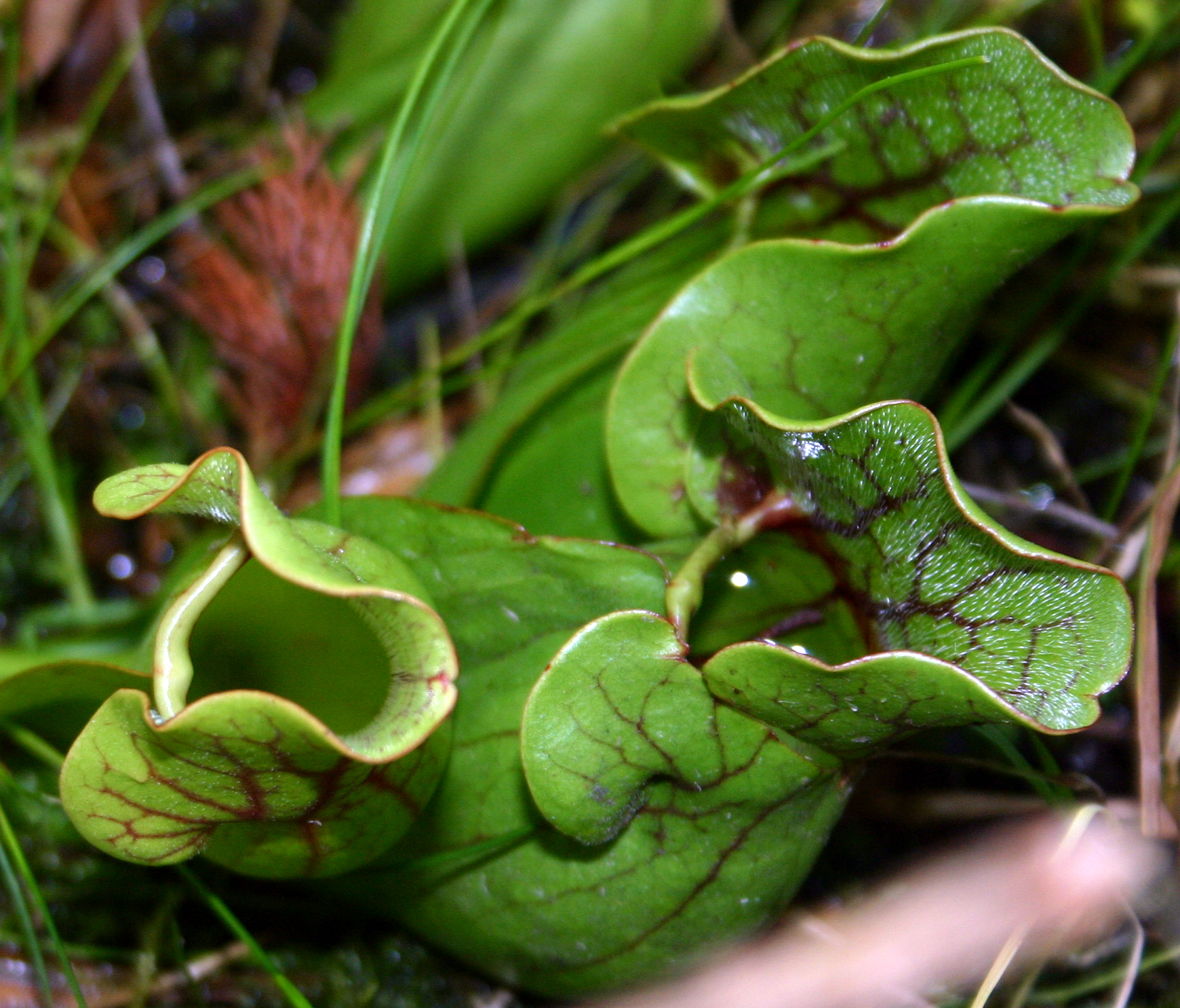
THE TRAVELER'S TREE.
AMONG the plants peculiar to the island of Madagascar is the "traveler's tree." By looking at the picture, you will see that it is rather a curious looking tree. It does not resemble our maples, oaks, elms, or poplars in the least. It certainly is not an American tree.
The leaves of this tree are from six to eight feet long, and look as if they might be fastened on the top. The tree loves a dry and sandy soil, and grows most beautifully even in the dryest weather. Each leaf contains a quantity of pure, fresh water; and as it is very difficult for travelers to get water to drink in this dry region, these trees take the place of wells. At all seasons of the year, whenever a spear is stuck into the stalk of the leaf, and drawn out, a stream of water gushes out, affording a cool, sweet, and wholesome beverage.
Its wood is often used in the construction of dwellings, and for many domestic purposes.
Our Creator has indeed arranged everything for the benefit of man, and has made everything of use.
NATURE'S MUG.
WHO ever heard of a natural mug?
Well, there is just such a thing in the
West Indies. It grows on trees in
hot climates where there is little rain.
These mugs hold about a quart. When
the dew and rain falls, it is received into
the mug; and a valve closes at the top,
and prevents evaporation. Birds are
often seen to insert their beaks and
procure water from them. This shows
how good God is in thus providing a
drinking-place for the little birds that
live where water is hard to find.
"They sow not, neither do they reap,
nor gather into barns; yet your
Heavenly Father feedeth them."
THE MILK-TREE.
THERE is a milk-tree in Venezuela that yields a liquid very much like cow's milk or cream. The natives go each morning to the forest, make some deep cuts in the trees, and in less than two hours their vessels are full. They use it to drink, and to mix with tapioca and maize. The tree is from forty-five to sixty feet in height, and has long, alternate leaves. The government of Venezuela sent to the Paris Exposition several bottles of this milk, which has been analyzed by prominent scientific men.
It contains sugar, caseine, and other things found in cow's milk, but is richer, and much more nutritious

Water
FROM THE PITCHER PLANT.
CERTAIN plants and trees which spring up in dry and sun burnt soils have the wonderful power of secreting pure water for the use of birds and animals, and even human beings who reside in or pass through these regions. The most remarkable is the Pitcher Plant.
From the end of each of the large leaves there hangs a pitcher with a lid moving on a hinge. The lid is wide open when the weather is moist, and shut up quite close when it is dry.
In each of these pitchers is about a pint of pure water, which is not received from the summer shower, or from without, but is distilled from within the plant itself. When full of water, the pitcher might turn over from the weight, and its contents be spilled; but behind the lid there is placed a little hook, which, with marvelous sagacity, catches hold of some twig or tendril, and thus obtains the required support.
What a wonderful and merciful provision of Providence is this for the benefit of the creatures which live in or pass through those regions of Southern China, India, Africa, and other tropical countries, in which, during a portion of the year, the streams are dried up! The following story well illustrates this:
"Two brothers who were traveling in South America, one day found by the roadside a little monkey which had broken one of its legs. The elder brother immediately with his handkerchief and a small stick bound up the broken leg, and taking the small creature in his arms, went on his way. Though sharply ridiculed by the younger for wasting his time and strength on 'only a monkey,' he persevered, knowing the animal would die if left to itself.
"After some days the travelers found themselves in a region destitute of water. The burning sun seemed to dry up the very blood in their veins.
A whole day passed, and another, and no water was to be found. At last the younger brother threw himself upon the ground, declaring that he could go no farther; he would lie down on the hot sand and die. At this critical moment the sagacious little monkey started up and hobbled away as fast as his crippled legs could carry him, but soon returned and tried to induce his preserver to follow him. The man did so, and the monkey led the way to a large, open field, covered with the pitcher plant, each cup filled with pure, fresh water.
"With eagerness the thirsty travelers took the cooling draught, and they thanked God, then and ever after, for the means by which he had preserved their lives; for the monkey every day led them to these natural reservoirs, until they 'reached their journey's end in safety."
There are many different kinds of the pitcher plant. That represented in the picture is from a tree, which grows to the height of twenty or thirty feet, and the pitchers are twelve inches long by six broad. They vary in size from these trees to the small plants with very little pitchers, specimens of which are sometimes seen in florists' windows.
COMMON SCENES.
AMID THE WATERS.
IN what endless and pleasing forms is water presented to the eye! We have already learned to admire the infinite cloud-forms for their beauty; let us now notice the dew, the rain, the ice, and the snow, and finally the flowing water.
Can a more exquisite sight be imagined than the ten thousand times ten thousand sparkling, trembling dew-drops, pendant upon the countless grass spires of living green, upon every delicate flower-cup, and upon every new-born leaf? A hundred mornings every year this scenes repeats itself, and we may draw pleasure from it without expense.
There is beauty in the falling shower,—a beauty not wholly dependent upon the form and motion of its countless drops; it suggests to the mind something of the fullness, and purity, and freedom of the heavens.
With the formation of ice and snow is connected an unthought-of change,
the formation of heat.
When large quantities of snow are crystallized in the air, or large surfaces of water are frozen, great quantities of heat are set free. You may have often noticed on such occasions that the weather is much warmer, particularly during a heavy fall of snow.
When the wintry fog and frost have crystallized every plant of the fields, every brown forest leaf, and every swaying branch, what a glittering array of icy pinnacles does the wintry moonlight reveal through the old woods! while beneath our feet with a brighter light flash the crystals of the snow.
We have all, perhaps, had our favorite brook side by which we played in childhood, and by it some of us still linger in imagination; for there is something inspiring in the sight of running water. One's favorite brook winds through the prairies. Deep among the yellow flowers and nodding grasses it watches over its steep banks for the morning sun,—now lingering to mirror the bright flower, then hurrying on, it finally turns between its steep banks, and stops to form a little lakelet in the warm sunlight, where the loosened bank has fallen across its way. Growing on an island in the little lake, is a green willow, grateful to the eye, for no other tree has dared to grow for miles around. The placid water, seemingly surprised at its own sudden motion, leaps over the little barrier below, and goes hurrying on. Meeting another of its own genial nature, both run laughing and sparkling to meet the broad river.
On one of our great rivers, let us watch the moving scene. Broad and strong and deep is, the current. Tangled water-plants, floating driftwood or broken boxes, remind us of the shoals, the vast forests, or the busy cities above. An ever-lengthening, ever-fading line of smoke from a receding tug, with its train of barges, gives a bold relief to the scene. Beautiful steamers and freighted schooners are constantly passing us.
Blue sky and fleecy clouds above, are reflected below. Now a denser cloud at the right turns the water beneath to ink, while to the left is a sea of green. Before us and behind, purple is reflected from every wave—then all is silvered with sunlight.
Though most of us may never gaze upon the ocean, we may at small expense look out upon the Great Lakes. The horizon, boundless as the sea; the rolling waves, white-capped and resistless; the swelling breeze and the yielding sands upon the shore, fill the mind with a feeling of the sublime, when the ponderous engine, the massive building, and the lofty tower are powerless.
GEO. R. AVERY.